On April 6 in the chamber of the National Assembly international two-day conference on the theme “The Role of National Assembly-Civil Society Cooperation in the Fight Against Corruption” began the works 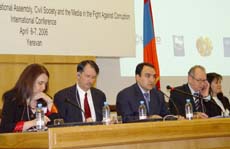 in National Assembly. The conference organized by RA National Assembly, OSCE, Eurasia fund, USAID and UNDP program is dedicated to the role of cooperation of the Parliament, Civil Society and Mass Media and its prospects as an effective mechanism for the fight against corruption. Representatives from the Parliament, Government, Civil Society and Mass Media, foreign journalists, representatives of international organizations, public and foreign monitoring bodies of foreign countries, international and local experts attended the conference.
in National Assembly. The conference organized by RA National Assembly, OSCE, Eurasia fund, USAID and UNDP program is dedicated to the role of cooperation of the Parliament, Civil Society and Mass Media and its prospects as an effective mechanism for the fight against corruption. Representatives from the Parliament, Government, Civil Society and Mass Media, foreign journalists, representatives of international organizations, public and foreign monitoring bodies of foreign countries, international and local experts attended the conference.
Artur Baghdasaryan, NA President welcomed the conference representatives:
The consistent fight against corruption is a political necessity for Armenia. On the pathway to consistent deepening of democratic reforms, formation of free and competitive market, the corruption phenomena serve as serious hindrances. Bribery, hopeless rates of shadow economy, bureaucratic delays, the application of non-transparent methods in certain administrative circles hinder the process of reforms. Taking into account the importance of this international conference about strengthening the fight against corruption, the role of parliaments, civil society and mass media in this process, I would like to draw your attention on some issues.
democratic reforms, formation of free and competitive market, the corruption phenomena serve as serious hindrances. Bribery, hopeless rates of shadow economy, bureaucratic delays, the application of non-transparent methods in certain administrative circles hinder the process of reforms. Taking into account the importance of this international conference about strengthening the fight against corruption, the role of parliaments, civil society and mass media in this process, I would like to draw your attention on some issues.
First, the transparent and effective activities of state-governmental bodies are closely related with the problems of fighting against corruption. We cannot spend simultaneously both much and badly. We must cut and consolidate the state expenditures, increase their effectiveness. The results of state-governmental bodies’ activities must be transparent, overseen and evaluated. They should be obliged to provide high results for expenditures. For instance, in the advanced western world the state expenses are high, the evaluation criteria are strict, activities are public, open to monitoring and available for the public and civil sector.
 Second, the role of consistent and unbiased application of law is great in the fight against corruption. There should not be privileged people before the law; the law should not be powerless in the fight against anarchy, unsubstantiated bureaucratic delays, abuse of state power and other vicious phenomena. The protection of citizens’ rights and duties must be viewed as a state priority.
Second, the role of consistent and unbiased application of law is great in the fight against corruption. There should not be privileged people before the law; the law should not be powerless in the fight against anarchy, unsubstantiated bureaucratic delays, abuse of state power and other vicious phenomena. The protection of citizens’ rights and duties must be viewed as a state priority.
Third, in the Tax and Customs structures the fight against shadow economy, corruption and bribery must be strengthened. Effective tax and customs governance may greatly support the decrease of corruption risks if it is guided by continuous reforms.
I deeply believe that the punishing contents of tax and customs system should be changed by such a system which would revitalize the faith of businessmen and employees, a system which is paying for an initiation, supports efforts, provides progress. This means a change in the philosophy of state – taxpayer relations, this means a trust towards the employer, make him/her a collaborator and cut taxes. In my belief, the less the taxes the more the liberties and the more motivated the taxes are the better the economy and the people of a state are.
Four, it is not possible to achieve success in the fight against corruption without serious reforms in the judiciary and law-enforcing system. The law must not be tacit, especially in those fields where illegalities are mushrooming. The fight against corruption and bribery must be priority in the judiciary system, which would in its turn support the restitution of people’s trust toward the victory of justice and legality. Both in the protection of human rights and the economic development the establishment of independent judiciary system is a political priority for Armenia.
Five, citizens must be aware of their rights, because it is obvious that bad laws and decisions provide good opportunities for abuses. The motto ‘if you do not know your rights you have no rights’ today sounds more than actual, because in many cases the nescience of law provides fertile ground for the development of corruption. People should know that awareness of law may rescue them of responsibilities, but nescience will never. Besides, the citizen armed with rights is always more protected. 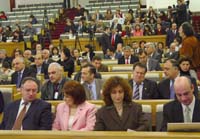 This is the reason why we must initiate serious steps on this path with all the other interested international organizations.
This is the reason why we must initiate serious steps on this path with all the other interested international organizations.
Six, for achieving success in the fight against corruption the active role of civil society is greatly important. In my opinion, the foreign aids for economic developments may have purposeful results if they are guided by fostering of democratic reforms as well as by active public monitoring. I am glad that in the Millennium Challenge Compact (MCC) program a great role is endowed with public monitoring. Supporting this process we are sure that it would create transparency and trustfulness to this most important program.
Seven, the role of independent press and mass media is pivotal in the fight against corruption. It is well known that abuses and illegalities in several areas are not few in our reality. In the studies of only Control Chamber there are several proofs. The same concerns the shortcomings pointed out by the World Bank and other financial structures. I am sure that the revelation and targeting of those phenomena, appropriate public monitoring, the discoveries of corruption cases by mass media will make the activities of governmental bodies and officials more respectable.
Eight, it is well known that the parliamentarian monitoring over budget procedures, credits and loans in many democratic countries around the world has a significant role. In this sense the membership of the National Assembly of Armenia in GOPAC (Global Organization of Parliamentarians Against Corruption) and the foundation of its national chapter in Armenia is very important, a chapter we are sure would have its input in the fight against corruption. In this context it is very important within the frames of the amended constitution to adopt a new law on the Control Chamber and to strengthen the parliamentarian monitoring over the effectiveness of the use of credits and loans.
Nine, corruption is ubiquitous: this mere fact requires from us a consistent and systematic fight. The legislative and institutional reforms, the consistent application of law, the active struggle of civil society against the ‘shadow rights’, public discussions devoted to forestall corruption (such as conferences, round-tables, seminars, etc.) could greatly contribute to focusing the public attention on the fight against corruption and on the indefatigable fight against corruption.
Ten, central in the fight against corruption must be the feeling of the inevitability of responsibility. For that reason we should pay not only serious attention to corruption cases and manifestations, but also take steps for calling the culprits to responsibility, i.e. the inevitability of responsibility essentially reduces the level of corruption.
We could talk about corruption much bringing other arguments and approaches as well, but as a summary, I would like to connect the successful fight against corruption with the progress of democracy, because democracy means transparency, supervision, public monitoring and other pivotal contents, that is to say everything, which is necessary for achieving success in this difficult struggle.”
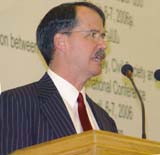 John Evans, Ambassador of US Plenipotentiary and Extraordinary in Armenia also gave a welcoming speech. He noted that: “Millennium Challenge Corporation gives a special boost to countries, which, according to objective criteria, are: ruling justly, investing in their own democracy and supporting economic freedom. At the core ‘ruling justly’ is a duty to promote good governance, to adhere to internationally accepted democratic principles, including free and fair elections. In accepting the Millennium Challenge, the Government of Armenia publicly reaffirmed its commitment to these principles. The Government’s current “Anti-Corruption Strategy and Action Plan” was an important first step in the fight against corruption, but more remains to be done. It is not a struggle that the Government of Armenia should or must wage alone. It is a struggle in which every sector of society has an important responsibility and role to play, include those of you who are here today representing the National Assembly, Civil Society and NGOs, and especially the Media. When there is a will to fight corruption, you will find there are others who are ready to provide help. For its part the United States will help Armenia.”
John Evans, Ambassador of US Plenipotentiary and Extraordinary in Armenia also gave a welcoming speech. He noted that: “Millennium Challenge Corporation gives a special boost to countries, which, according to objective criteria, are: ruling justly, investing in their own democracy and supporting economic freedom. At the core ‘ruling justly’ is a duty to promote good governance, to adhere to internationally accepted democratic principles, including free and fair elections. In accepting the Millennium Challenge, the Government of Armenia publicly reaffirmed its commitment to these principles. The Government’s current “Anti-Corruption Strategy and Action Plan” was an important first step in the fight against corruption, but more remains to be done. It is not a struggle that the Government of Armenia should or must wage alone. It is a struggle in which every sector of society has an important responsibility and role to play, include those of you who are here today representing the National Assembly, Civil Society and NGOs, and especially the Media. When there is a will to fight corruption, you will find there are others who are ready to provide help. For its part the United States will help Armenia.”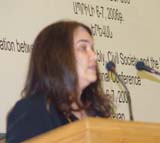
Andrea Harris, Eurasia Foundation Regional Vice President for the South Caucasus highlighted the reformation of the steps in fight against corruption, in particular, the improvement of National Assembly-Civil Society cooperation, the rise of the role of the Mass Media, institutions of public monitoring: “I hope that important proposals will be submitted in connection with these issues, and the result of this conference will be the first step for the new anti-corruption initiative, which will focus on the abilities of the Government, NGOs and Mass Media.”
In the words of Consuelo Vidal, UN Resident Coordinator, the corruption is a serious challenge for the  development of Armenia. She also highlighted the public participation in fighting corruption: “Our organization assists the anti-corruption programs, in particular, conducts monitoring in the sphere of health care and education, and will carry on working in this direction. UNDP is also ready to assist the Government of Armenia, National Assembly, Civil Society for the fulfillment of serious programs in fighting corruption.”
development of Armenia. She also highlighted the public participation in fighting corruption: “Our organization assists the anti-corruption programs, in particular, conducts monitoring in the sphere of health care and education, and will carry on working in this direction. UNDP is also ready to assist the Government of Armenia, National Assembly, Civil Society for the fulfillment of serious programs in fighting corruption.”
Vladimir Pryakhin, Ambassador/ OSCE Office Head in Yerevan noted that highlights the fighting against corruption. In his words, 6 years ago when the Government of Armenia declared the anti-corruption policy as a priority of the home policy, took a right step, creating important preconditions for the further development of the country in the aspect of democracy development. The Government has taken a number of steps in that direction. The OSCE Office has assisted a number of programs. As the Ambassador said, the successes are obvious but there are still many unsolved problems. The Constitutional reforms create favorable conditions in fighting against corruption for the rise of the role of the parliament, which will be of great importance for achieving successes. Mr. Pryakhin noted that Armenia activates the efforts participating in OSCE anti-corruption network, expressing 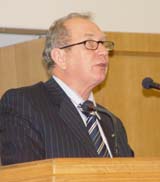 satisfaction on the membership of Armenia to GOPAC. “The availability of the political will is of great importance in the fight against corruption, otherwise our sensual speeches will remain on the paper,” noted Mr. Ambassador.
satisfaction on the membership of Armenia to GOPAC. “The availability of the political will is of great importance in the fight against corruption, otherwise our sensual speeches will remain on the paper,” noted Mr. Ambassador.
Samvel Farmanyan, NA President’s Counselor read the message of Martin Ulrich, Executive Secretary of GOPAC to the conference participants.
The first sitting of the conference was dedicated to NA-Civil Society cooperation. Mher Shahgeldyan, Chairman of the NA Standing Committee on Defence, National Security and Internal Affairs touched upon the theme with the report “Cooperation between Parliament and Civil Society in Combating Corruption.” He highlighted the necessity of cooperating with world community, noting that in the aspect of creating an effective management system for Armenia it’s important to involve all the forces in the fight against corruption, who are ready to display such will. The fight against corruption isn’t possible to limit with only the forces of state institutions or civil society. In this case the union of political and civil societies process of comparing the forces very necessary. The corruption phenomena suppose exclusion of the abuse of the unauthorized exercise of office, shadow activity, transparency. The democracy supposes publicity, monitoring of civil society on the state management system and has numerous mechanisms in the aspect of the fight against corruption. One of them is considered the mechanisms of civil society: monitoring by parliamentary and civil society  institutes. The first is immediately conditioned by the role and rise of the importance of the parliament, development of the parliamentarism. The constitutional reforms created its opportunity. The parliaments have three levers in this issue: adoption of laws inclined to the fighting against corruption phenomena, providing parliamentary tribune for public speeches, queries and claims: after the reforms the National Assembly had an opportunity for claim. The next lever is the monitoring function, in particular, in financial field. The rise of the role of NA Control Chamber will promote it. The education and awareness is also important: the parliaments and civil society institutes contact more with the people. It’s necessary to increase more that contact. The role of mass media is very important in the aspect of the public awareness.
institutes. The first is immediately conditioned by the role and rise of the importance of the parliament, development of the parliamentarism. The constitutional reforms created its opportunity. The parliaments have three levers in this issue: adoption of laws inclined to the fighting against corruption phenomena, providing parliamentary tribune for public speeches, queries and claims: after the reforms the National Assembly had an opportunity for claim. The next lever is the monitoring function, in particular, in financial field. The rise of the role of NA Control Chamber will promote it. The education and awareness is also important: the parliaments and civil society institutes contact more with the people. It’s necessary to increase more that contact. The role of mass media is very important in the aspect of the public awareness.
Mher Shahgeldyan also highlighted the study and use of the experience of the international organizations while joining them in our country. The activity of the national center of GOPAC organization created in Armenia was highlighted.
Ashot Khachatryan, Head of NA Department of Legislative Analysis and Development made a report 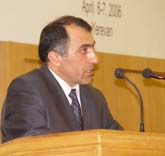 on the theme “Corruption and ‘Shadow Right:’ Legislation as an Effective Means of Fighting.” He touched upon the key problem corruption and shadow right relationship, the inter-relation with non-effective legislation, the shadow right as the spheres of displaying the phenomenon causing corruption, the impact of the ‘shadow right’ towards the official right.
on the theme “Corruption and ‘Shadow Right:’ Legislation as an Effective Means of Fighting.” He touched upon the key problem corruption and shadow right relationship, the inter-relation with non-effective legislation, the shadow right as the spheres of displaying the phenomenon causing corruption, the impact of the ‘shadow right’ towards the official right.
During the session Abgar Yeghoyan, President of the Protection of 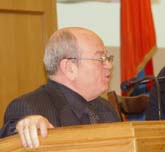 Consumers’ Rights NGO made a report “Existing Models of State-NGOs Partnerships,” presenting the works of their organization in this direction. The speech of Grigori Tomchin, Member of the Russian Federation Public Chamber, President of the Fund of Legislative Initiatives in Russai was dedicated to the model legislative provision of private-public partnership.
Consumers’ Rights NGO made a report “Existing Models of State-NGOs Partnerships,” presenting the works of their organization in this direction. The speech of Grigori Tomchin, Member of the Russian Federation Public Chamber, President of the Fund of Legislative Initiatives in Russai was dedicated to the model legislative provision of private-public partnership.
MPs Tatul Manaseryan and Arshak Sadoyan introduced their 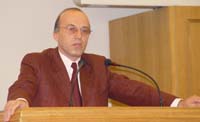 considerations. Tatul Manaseryan highlighted the organization of the conference, noting that the legislative body should be united with its partners in fighting against corruption. He noted that, first of all the authorities are accused in corruption and it’s a paradox that the fighting against corruption is trusted the executive body. In the executive body the MPs who received the people’s vote have more rights to speak about the fighting against corruption.
considerations. Tatul Manaseryan highlighted the organization of the conference, noting that the legislative body should be united with its partners in fighting against corruption. He noted that, first of all the authorities are accused in corruption and it’s a paradox that the fighting against corruption is trusted the executive body. In the executive body the MPs who received the people’s vote have more rights to speak about the fighting against corruption.
The second session was dedicated to the role of the public monitoring bodies in fighting against corruption. Aram Mamikonyan, head of the Judicial Service of NA Control Chamber (CC) presented the role of CC in fighting against corruption, the existing opportunities and perspectives after  constitutional reforms.
constitutional reforms.
Aram Mamikonyan noted the provisions concerning the  cooperation of CC and other structures executing monitoring, the relationship of CC and Prosecutor’s Office need clarification. It was informed that the established committee has begun the work of conforming the Constitution to the law on Control Chamber.
cooperation of CC and other structures executing monitoring, the relationship of CC and Prosecutor’s Office need clarification. It was informed that the established committee has begun the work of conforming the Constitution to the law on Control Chamber.
Bill Dupree, U.S. Treasury Senior Financial Enforcement officer touched upon the theme “Strengthening  Cooperation between the Control Chamber, Media and NGOs.” Mr. Dupree highlighted the joint work of the civil society, mass media and Government in fighting corruption.
Cooperation between the Control Chamber, Media and NGOs.” Mr. Dupree highlighted the joint work of the civil society, mass media and Government in fighting corruption.
Zbigniew Weselowski, Counselor of Supreme of Control of Poland presented the report “The Supreme Chamber of Control: Activity Towards Counteracting Corruption.” Presenting the activity of the Control Chamber of Poland, Mr. Weselowski noted that the goal of the Control Chamber is to disclose the risk zones of corruption, etc.
Armen Rustamyan, Chairman of NA Standing Committee on Foreign Affairs made a report on the theme 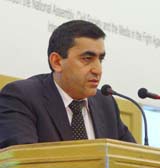 “The Role of Public Monitoring Bodies in the Fight Against Corruption.” Considering impossible the fight against corruption without use of the world experience, he pointed out two criteria of anti-corruption fighting: international cooperation and inner-state fighting with power and public components. According to Mr. Rustamyan, state clear approach is necessary to shape for the fulfillment of anti-corruption fighting and a front of real fighting. As he assessed, in the spheres of international judicial cooperation and adoption of experience Armenia has taken progressive steps, ratified a number of conventions inclined to the fight against corruption, 20 principles adopted by the Ministers of the Council of Europe, joins GRECO, GOPAC and other international organizations. Armen Rustamyan believes that in fighting corruption the new Constitution gives wide opportunities for the effective use of power mechanisms in anti-corruption fighting. Summing up the report he said that the anti-corruption fighting can’t be sufficient, the fight should be carried out with tried methods, forming a wide front of concerned and unbiased fighting.
“The Role of Public Monitoring Bodies in the Fight Against Corruption.” Considering impossible the fight against corruption without use of the world experience, he pointed out two criteria of anti-corruption fighting: international cooperation and inner-state fighting with power and public components. According to Mr. Rustamyan, state clear approach is necessary to shape for the fulfillment of anti-corruption fighting and a front of real fighting. As he assessed, in the spheres of international judicial cooperation and adoption of experience Armenia has taken progressive steps, ratified a number of conventions inclined to the fight against corruption, 20 principles adopted by the Ministers of the Council of Europe, joins GRECO, GOPAC and other international organizations. Armen Rustamyan believes that in fighting corruption the new Constitution gives wide opportunities for the effective use of power mechanisms in anti-corruption fighting. Summing up the report he said that the anti-corruption fighting can’t be sufficient, the fight should be carried out with tried methods, forming a wide front of concerned and unbiased fighting.
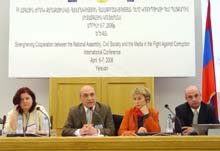 The third part of the international anti-corruption conference was dedicated to the role of the media against the corruption fighting. Opening the session Ashot Melikyan, Head of the Committee to Protect Freedom of Expression NGO, underscored that it’s not possible to combat corruption without active work of the mass media. At the same time the mass media can’t combat alone: in order to reach the result we must consolidate the efforts of the parliament, civil society and media.
The third part of the international anti-corruption conference was dedicated to the role of the media against the corruption fighting. Opening the session Ashot Melikyan, Head of the Committee to Protect Freedom of Expression NGO, underscored that it’s not possible to combat corruption without active work of the mass media. At the same time the mass media can’t combat alone: in order to reach the result we must consolidate the efforts of the parliament, civil society and media.
Ioanna Avadani, Director of the Center for Independent Journalism, Romania compared the fight against corruption with the three-legged stool, and for providing the balance three columns are necessary. In this case the speaker talked about the golden triangle: parliament, media and civil society. On the top of this triangle, as Mrs. Avadani presented, the parliament is the one expressing the people’s will, on the sides - the mass media as observers, and the civil society as a kind of power. The mass media shall draw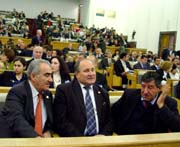 attention of the society to such phenomena, as the abuse of state post, dishonesty, the use of confidence with dishonest goals. Besides, they will educate the society, thinks the guest. As she comments, as higher is the degree of the corruption, as weaker is the freedom of press. The public transparent disputes and debates will create unfavourable conditions for the prosperity of corruption, she concluded in her speech. Mrs. Avadani also touched upon the problem: what impact has the corruption on the free speech? According to her, besides censorship, the press can be affected also with financial and economic levers. She talked about the link between the authorities, business world and mass media, presenting the corruption risks and the necessity of breaking that link.
David Sandukhchyan, Internews Armenia, Head of Legal Department, made a detailed report to the conference participants: “How Armenian Media Legislation and its Implementation Affect the Role of Journalists in Fighting Corruption.” As important preconditions in the fight against corruption, he noted the independence of media, the execution of the journalist’s right for his/her legal protection and obtaining information. He touched upon the local legislation gaps. The improved Constitution, as well as the amendments made in the law on Mass Media give provisions on independence of mass media, but there are difficulties in applying them, says the speaker. A provision is affirmed in the law, on Protection of the Information Source, but it’s not reflected in the Criminal Proceedings Code, therefore it’s not useful. Mr. Sandukhchyan also spoke about the body regulating the sphere of television and radio, considering it not independent and controllable by one person. In Armenia the self-censorship is widely spread, also numerous cases of violence committed towards the journalists while fulfilling their professional activity, says the representative Internews. One criminal case of mild responsibility of violence has been recorded. The criteria of licensing of broadcasting media prescribed by law on Television and Radio are very high, the speaker expressed dissatisfaction. As he presented,
attention of the society to such phenomena, as the abuse of state post, dishonesty, the use of confidence with dishonest goals. Besides, they will educate the society, thinks the guest. As she comments, as higher is the degree of the corruption, as weaker is the freedom of press. The public transparent disputes and debates will create unfavourable conditions for the prosperity of corruption, she concluded in her speech. Mrs. Avadani also touched upon the problem: what impact has the corruption on the free speech? According to her, besides censorship, the press can be affected also with financial and economic levers. She talked about the link between the authorities, business world and mass media, presenting the corruption risks and the necessity of breaking that link.
David Sandukhchyan, Internews Armenia, Head of Legal Department, made a detailed report to the conference participants: “How Armenian Media Legislation and its Implementation Affect the Role of Journalists in Fighting Corruption.” As important preconditions in the fight against corruption, he noted the independence of media, the execution of the journalist’s right for his/her legal protection and obtaining information. He touched upon the local legislation gaps. The improved Constitution, as well as the amendments made in the law on Mass Media give provisions on independence of mass media, but there are difficulties in applying them, says the speaker. A provision is affirmed in the law, on Protection of the Information Source, but it’s not reflected in the Criminal Proceedings Code, therefore it’s not useful. Mr. Sandukhchyan also spoke about the body regulating the sphere of television and radio, considering it not independent and controllable by one person. In Armenia the self-censorship is widely spread, also numerous cases of violence committed towards the journalists while fulfilling their professional activity, says the representative Internews. One criminal case of mild responsibility of violence has been recorded. The criteria of licensing of broadcasting media prescribed by law on Television and Radio are very high, the speaker expressed dissatisfaction. As he presented, 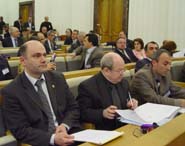 the experience shows that there are difficulties in applying the law on the Freedom of Information: often we manage to get information only through court instances. He conditioned the mentioned drawbacks not by the incompleteness of legislation, but the lack of political will.
the experience shows that there are difficulties in applying the law on the Freedom of Information: often we manage to get information only through court instances. He conditioned the mentioned drawbacks not by the incompleteness of legislation, but the lack of political will.
Milica Pesic, Executive Director of the Media Diversity Institute, also gave a speech on the role of press in the fight against corruption. She’s sure that in the issue of eradicating the phenomenon of corruption the mass media can be useful, making investigations, disclosing the drawbacks of anti-corruption bodies, making stronger and legitimizing those bodies, making pressures for the amendment of the laws creating favourable atmosphere for corruption. The role of media is great in the issue of making the citizens participant of different disputes, believes the conference participant. Saying that the journalists criticize only the others, she talked about the negative phenomena of the information field. When, for example, the journalist does ordered and paid work for that.
On April 7 the conference will resume the work. The group debates are envisaged.
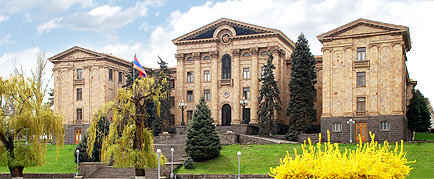


 08.08.2024
08.08.2024
